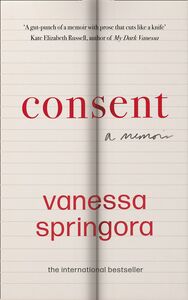You need to sign in or sign up before continuing.
Take a photo of a barcode or cover
dark
emotional
reflective
fast-paced
challenging
dark
emotional
inspiring
reflective
sad
tense
fast-paced
challenging
dark
emotional
informative
reflective
sad
tense
fast-paced
This book is not for everyone... it is extremely confronting. This is a story that needs to be told, because it shows just how complex and difficult consent really is. I think for many people, it will offer much-needed validation. These truths must come out.
The most shocking thing about V's ordeal, and this is clearly highlighted in her reflections on the experience, which took place between the ages of 13 and 15, is that it was an open secret. V's own mother was aware of it and condoned the affair as within V's rights to choose . Essentially, V was caught at a terrible intersection of the obsessive sexual liberation of French artistic elites at the time—to the extent of claiming it was a violation of an adolescent's rights to forbid them from sex with adults—parents who were tuned out of her emotional well-being, misogyny, and simply meeting the wrong man at the wrong time.
It wasn't just the relationship itself either. Springora cites how she was repeatedly victimized and unpersoned by Matzneff's frequent publishing of autobiographical works which openly recounted his distorted version of their affair, even referring to her by name. For decades before and after the affair, he waxes lyrical about the "sublime" and "passionate" relationships he's had with teenage girls, and the "warm memories" he leaves them with when they get too old for him (as well as his not infrequent abuse of male child prostitutes in the Philippines) . She becomes, to her desperate grief, a mere character in Matzneff's self-aggrandizing and self-absolving mythology.
In 2020, by then in her forties, Springora decided the best way to hit back was on Matzneff's own turf, with her own love of writing which he had stolen from her for so many years: and so she published Consent, finally depriving Matzneff of the freedom of being the first and last voice on his many abuses.
Springora's novel is a tight 5 hours on audiobook. She does not linger, but recounts her story, including the childhood experiences which may have made her particularly vulnerable to Matzneff's seduction, with intimate but clear honesty. She has an ear for elegant turns of phrase and skillfully illustrates how even as she continued her relationship with Matzneff and insisted it was what she wanted, the seed of its wrongness had been growing in her mind. With crushing bluntness she shows how jaded she had grown by a mere 15, already world-weary and exhausted by Matzneff's relentless manipulation. For the most part, Springora's story is delivered with calm, factual clarity, but there are a few moments when her simmering rage boils to the surface, and the power of these moments is palpable. In one scene, a sobbing V insisting that she cannot go on like this is told by an adult friend that she should be "honored" to be "chosen" by someone as great as Matzneff to "support him" on his journey as an artist. Both V the child and Springora the adult relating the episode remain in shocked, disbelieving fury at this response.
A broad indifference to Matzneff's victims persisted for decades. On televised interviews by major networks, Matzneff is playfully ribbed about his penchant for teenagers. A Canadian writer who calls him out as a predator is castigated by Matzneff's supporters and told she needs "a good fucking." V is approached by fans of Matzneff's who recognize her from his work, hoping she'll indulge their sexual fantasies as well. Even the young man who persuades V at last to leave Matzneff—a 22-year-old to V's near-16—also initiates a sexual relationship with her, and eventually grows tired of her depression, unable to see her trauma for what it is. At every turn, the system protects and even celebrates Matzneff. As recently as 2015, he was still receiving prestigious literary awards.
Springora takes this book not only to call out Matzneff's abuse, repeated across countless other children, but also everyone around them who knew of and tolerated it, who believed that his artistry placed him on some other moral plane where he could not be criticized by pedants concerned with restricting sexual impulses; as well as the entire societal system which said that V was not a victim, that she had consented to this, that responds to stories of teenage girls seduced by fifty-year-old men with cheeky grins, that doesn't even concern itself with foreign child prostitutes abused by pedophilic tourists.
Springora admits she wished one of Matzneff's other victims had published an account first, so that she wouldn't have to, but eventually she had to speak out, to take power back, and to point the finger at every person who enable this predator to carry on his grotesque work. And with this incisive, ringing indictment of a novel, she does. (And, at least, there have been consequences to Matzneff since Consent's publication, including apologies from Le Monde and other institutions which published some of his most repulsive essays in the 70s and 80s, as well as France raising the age of consent to 15.)
The translation by Natasha Lehrer is skilled and neat; she captures both Springora's more lyrical phrases and the emotionally charged but sometimes understated descriptions. The prose flows well and the dialogue sounds natural. Anne-Marie Piazza does a wonderful job with the audio narration as well, particularly given the weight of the content. She matches Springora's mostly calm tone, and perfectly channels the barely-leashed rage that surfaces at times.
Overall an excellent work. Not enjoyable, given the story, but important, and well-done.
En bok som gör ont att läsa. Sakligt men med en passande bitter underton så berättar V om sina erfarenheter av en sexuell predator.
fast-paced
Li este livro num só fôlego. Não por ser pequeno, mas por merecer, por sentir que foi escrito com urgência de ser lido.
“A mentira é literatura, minha querida! Não sabia disso?”
O relato da sua relação de adolescente com o escritor Gabriel Matzneff que além de falar escrevia sobre as suas práticas pedófilas nos seus livros - aclamados por muitos. Ao ponto de ter recebido prémios por eles. Após o relato escrito de Vanessa houve uns quantos membros do júri do prémio Renaudot (2013) que se demitiram.
O livro está incrivelmente bem escrito, não há descrições gráficas (como expectável num livro destes - e obrigada porque provavelmente não o conseguiria ler), vai direto ao ponto e não se perde em pormenores. Se Vanessa não tivesse a coragem de escrever o que escreveu provavelmente este tema não teria sido discutido como foi. Ainda assim, Gabriel M foi levado a tribunal em 2021 (1 ano depois da publicação de Consentimento) mas o caso foi arquivado por ter prescrito.
“Um órgão de comunicação social nunca é senão o reflexo da sua época, dirão, em sua defesa”
Não é um ataque direto ao pedófilo mas sim a exposição dos problemas da vítima desse mesmo homem.
“aos catorze anos, não devíamos ter um homem de cinquenta anos à nossa espera à saída do liceu, não devíamos viver com ele num hotel, nem estar na sua cama, com o sexo dele dentro da boca à hora do lanche. Tenho consciência de tudo isso, apesar dos meus catorze anos, não sou completamente desprovida de senso comum. Desta anormalidade, fiz, de certa forma, a minha nova identidade.”
Não estamos a falar do século 18, estamos a falar dos anos 80 onde foram palco de um homem completamente nojento que era conhecido pelas suas práticas E ACLAMADO!
A Vanessa teve uma mestria e uma coragem para escrever este livro que não há palavras para descrever.
“A mentira é literatura, minha querida! Não sabia disso?”
O relato da sua relação de adolescente com o escritor Gabriel Matzneff que além de falar escrevia sobre as suas práticas pedófilas nos seus livros - aclamados por muitos. Ao ponto de ter recebido prémios por eles. Após o relato escrito de Vanessa houve uns quantos membros do júri do prémio Renaudot (2013) que se demitiram.
O livro está incrivelmente bem escrito, não há descrições gráficas (como expectável num livro destes - e obrigada porque provavelmente não o conseguiria ler), vai direto ao ponto e não se perde em pormenores. Se Vanessa não tivesse a coragem de escrever o que escreveu provavelmente este tema não teria sido discutido como foi. Ainda assim, Gabriel M foi levado a tribunal em 2021 (1 ano depois da publicação de Consentimento) mas o caso foi arquivado por ter prescrito.
“Um órgão de comunicação social nunca é senão o reflexo da sua época, dirão, em sua defesa”
Não é um ataque direto ao pedófilo mas sim a exposição dos problemas da vítima desse mesmo homem.
“aos catorze anos, não devíamos ter um homem de cinquenta anos à nossa espera à saída do liceu, não devíamos viver com ele num hotel, nem estar na sua cama, com o sexo dele dentro da boca à hora do lanche. Tenho consciência de tudo isso, apesar dos meus catorze anos, não sou completamente desprovida de senso comum. Desta anormalidade, fiz, de certa forma, a minha nova identidade.”
Não estamos a falar do século 18, estamos a falar dos anos 80 onde foram palco de um homem completamente nojento que era conhecido pelas suas práticas E ACLAMADO!
A Vanessa teve uma mestria e uma coragem para escrever este livro que não há palavras para descrever.
dark
informative
sad
medium-paced
The profound story of a survivor of childhood sexual abuse. V. share her story with vulnerability, poignancy, and haunting descriptions of emotions & experiences. An uncomfortable read that I read over 1.5 months. One-sit read: unlikely. I require Processing time for heavier subjects.



